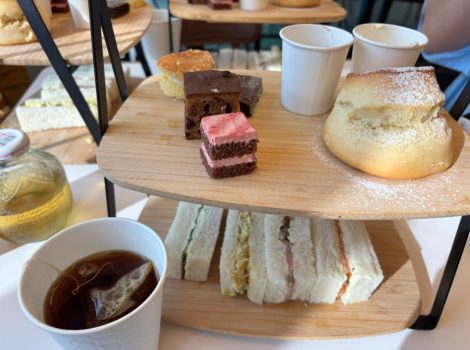 Pin
Pin Image by @ameagaranai/X
FOODEX Japan 2025, held at Tokyo Big Sight, is Asia’s premier international food and beverage exhibition, attracting approximately 80,000 attendees annually. From March 11–14, the UK Pavilion showcased a diverse selection of high-quality British products, including renowned tea brands like Whittard of Chelsea and The Tea Makers of London.
However, the British Embassy’s decision to serve a Rs 3,000 tea set in paper cups during the event drew criticism. Attendees and social media users expressed disappointment over the lack of traditional teaware, viewing it as a missed opportunity to honor the cultural significance of tea ceremonies in both British and Japanese traditions.
This incident highlights the importance of cultural sensitivity and presentation in international events, especially when showcasing products deeply rooted in tradition.
Table of Contents
Public Reaction and Cultural Expectations
The British Embassy’s decision to serve a Rs 3,000 tea set in paper cups at FOODEX 2025 sparked significant backlash, particularly on social media platforms. Many attendees and online commentators expressed disappointment, viewing the choice as a disregard for the cultural significance of tea in both British and Japanese traditions. One user on X (formerly Twitter) remarked, “As a Brit resident in Japan, it’s embarrassing, & 5,000 yen!” highlighting the perceived mismatch between the tea’s premium pricing and its presentation .
In Japan, tea ceremonies are deeply rooted in cultural practices, emphasizing aesthetics, respect, and mindfulness. Serving high-end tea in paper cups was seen as incongruent with these values, leading to perceptions of cultural insensitivity. The incident underscores the importance of understanding and respecting local customs, especially when representing one’s country on an international stage.
Following the criticism, the British Embassy acknowledged the oversight and replaced the paper cups with ceramic ones, aiming to align better with cultural expectations and restore the intended experience of enjoying premium British tea.
Cultural Significance of Tea in British and Japanese Traditions
Tea holds a revered place in both British and Japanese cultures, symbolizing more than just a beverage—it embodies tradition, ceremony, and social connection. In Britain, afternoon tea is a cherished ritual, often associated with elegance and hospitality. Similarly, Japan’s tea ceremonies, or “chanoyu,” are deeply rooted in Zen Buddhism, emphasizing harmony, respect, and tranquility.
The British Embassy’s choice to serve a Rs 3,000 tea set in paper cups at FOODEX 2025 inadvertently overlooked these cultural nuances. For many Japanese attendees, the presentation clashed with their expectations of a tea experience that honors tradition and mindfulness. This misstep underscores the importance of cultural awareness, especially when representing one’s heritage on an international platform.
Recognizing the oversight, the embassy promptly replaced the paper cups with ceramic ones, aiming to align better with the cultural significance of tea in both nations. This swift response highlights the value of adaptability and respect in cross-cultural engagements, ensuring that such events foster mutual appreciation and understanding.
Lessons in Cross-Cultural Presentation
The British Embassy’s experience at FOODEX 2025 underscores the critical importance of cultural sensitivity in international events. Serving a Rs 3,000 tea set in paper cups may have seemed practical, but it clashed with Japanese expectations, where presentation is integral to the tea experience. This misstep highlights how even well-intentioned actions can be misinterpreted without a deep understanding of local customs.
In Japan, the aesthetics of serving tea—such as the use of ceramic cups—are as significant as the beverage itself. The initial use of paper cups was perceived as a lack of respect for this tradition. Recognizing the oversight, the embassy swiftly replaced them with ceramic cups, demonstrating adaptability and a willingness to honor local customs.
This incident serves as a reminder for organizations to thoroughly research and respect cultural practices when engaging in international events. Such mindfulness not only prevents misunderstandings but also fosters goodwill and stronger cross-cultural relationships.
The Price Tag Controversy – Was the Tea Worth Rs 3,000?
The Rs 3,000 price tag attached to the tea set caught the attention of many, not just for its cost but for how it clashed with the disposable cups it was served in. People expected a premium experience—something that matched the branding of “British luxury tea.” Instead, what they got felt more like a rushed service at a corner stall, despite being at a major international expo.
Many questioned the justification behind the price. Was the tea rare? Was it infused with gold? Was it curated from an exclusive estate? None of these answers came forward clearly. And when you’re charging that much, people expect more than just a decent brew—they expect atmosphere, service, and presentation. Even Japanese tea ceremonies, which use matcha that can be expensive, justify the price through ritual and craftsmanship.
This part of the incident made people ask if the British Embassy was selling the idea of tea or just tea itself. And if it’s just tea, then paper cups can’t justify that price.
Damage Control – How the British Embassy Responded
Once criticism started snowballing across Japanese and global social media platforms, the British Embassy in Japan had no choice but to respond. They didn’t wait too long. After people pointed out the mismatch between the Rs 3,000 tea set and the paper cups, the embassy quickly swapped them for ceramic teacups—a small but meaningful gesture that acknowledged the issue.
This wasn’t just about optics. It was about showing that they were listening. In an age where public opinion spreads fast, institutions that stay silent often face harsher backlash. The embassy’s quick pivot helped prevent the situation from escalating further. Though they didn’t release a formal apology, the change in presentation spoke louder than words.
Still, many felt the embassy missed an opportunity to turn it into a positive cultural moment. A short video or explanation of the tea’s origin, served in a proper setting, could’ve transformed the experience entirely. Instead, the focus remained on the blunder and the quick fix, not the tea itself.
Missed Opportunity for British Tea Branding
FOODEX Japan is a goldmine for international brands wanting to make a mark in Asia. With thousands of industry professionals attending, it’s the perfect place to elevate British tea culture on a global stage. But by serving the Rs 3,000 tea set in paper cups, the British Embassy missed a huge chance to create a lasting impression.
The goal should’ve been clear—connect with a Japanese audience that deeply respects tradition and detail. A visually appealing setup, complete with fine china and storytelling around the tea’s origin, would’ve done more than just impress. It would’ve sold an experience, not just a product. Tea, in both countries, is about connection. They could’ve highlighted shared cultural values instead of letting a flimsy paper cup become the main headline.
What’s frustrating is that the tea brands showcased are genuinely high quality. But presentation matters. The embassy’s approach unintentionally diluted the value of those products. What could’ve been a proud cultural showcase ended up becoming a PR misstep.
What This Means for International Diplomacy Events
The Rs 3,000 tea in a paper cup situation is more than just a funny headline—it reflects the delicate nature of diplomacy in modern times. When embassies represent their countries abroad, every detail matters. People don’t just see the product—they see the values, the culture, and the effort behind it. That’s what makes these moments so important.
Events like FOODEX are not just business expos—they’re cultural exchanges. Embassies have a unique opportunity to blend soft power and branding by showing respect to local customs while promoting their own. The backlash here shows what happens when even one small detail feels off. In today’s world, that one detail becomes the story.
For future diplomatic events, the takeaway is simple: authenticity and presentation must go hand in hand. The world is watching—not just what you’re offering, but how you’re offering it. And when countries make the effort to get that right, they earn more than just sales—they earn trust and admiration.
How Brands Can Learn from This Mistake
The British Embassy might have taken the hit publicly, but there’s a lot here for brands and marketers to learn. When you’re showcasing a premium product—like a Rs 3,000 tea set—the experience must reflect the price. That means packaging, presentation, and storytelling must all align. People don’t just pay for what’s inside the cup; they pay for the full vibe around it.
For brands looking to enter foreign markets, especially one as culturally rich as Japan, surface-level planning isn’t enough. You have to go deeper. What does tea mean to the audience? What do they expect from a luxury product? In Japan, beauty and detail are part of everyday life. A paper cup at a high-end tasting? That reads as careless, not classy.
This isn’t just about tea. It’s a lesson in branding. If you’re asking someone to invest emotionally or financially in your product, every element—from design to delivery—needs to reflect the value you promise. Otherwise, someone else will.
Final Thoughts – Small Details, Big Impact
In the world of cultural diplomacy and branding, small choices can make or break the entire message. The Rs 3,000 tea set served in paper cups might seem like a minor oversight, but the public reaction proved it wasn’t. It became a symbol of disconnect between intention and execution—a reminder that no detail is too small when you’re representing a nation or a brand on the world stage.
The British Embassy did try to fix the mistake by replacing the cups, but the story had already spread. That moment became a case study in how people today are hyper-aware, detail-focused, and quick to call out things that feel inauthentic or mismatched. In contrast, when brands or institutions show they understand and respect the culture they’re engaging with, they earn long-lasting respect.
In the end, this was more than just about tea. It was about awareness, respect, and the impact of presentation. And maybe next time, that Rs 3,000 tea will taste as premium as it should—served in a cup that actually fits the price.
FAQs
The British Embassy served a premium Rs 3,000 tea set in paper cups at FOODEX Japan 2025, likely for convenience or cost reasons. However, this decision was seen as disrespectful to Japanese tea culture, where presentation is just as important as the beverage itself.
The reaction was largely critical. Many attendees and online users mocked the presentation, saying it didn’t match the price or the cultural expectations of either British or Japanese tea traditions. The embassy later switched to ceramic cups after backlash.
The quality of the tea might have been high, but the poor presentation made people question its value. In luxury offerings, experience and presentation matter just as much as the product itself.
They quickly changed the paper cups to ceramic ones after receiving criticism. While they didn’t issue a formal apology, the switch was seen as an effort to correct the mistake and show cultural sensitivity.
Brands and embassies must ensure that presentation, product value, and cultural expectations are in sync. A mismatched presentation can damage reputation and overshadow the product itself.






























